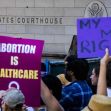The Right to Abortion, ushered into the US in 1973, was a constitutional right for women seeking an abortion. On June 24, 2022, the Supreme Court of the United States (SCOTUS) overturned this constitutional right. Travel in the US is also a constitutional right, and it is a reality that SCOTUS may also overturn this right for pregnant women who seek an abortion in a different state where it is legal.
Just like abortion, now illegal in many states, the constitutional right to travel is not explicitly included in the Constitution. Instead, the High Court has interpreted freedom of movement as a foundational right.
Strong fallout and confusion resulting from the SCOTUS decision to overturn Roe V. Wade, the 1973 decision that guaranteed all women the right to abortion in the US, is fanning out from coast to coast, with millions of Americans questioning how individual states will enforce their anti-abortion laws.
Shades of The Handmaid’s Tale, a 1985 Dystopian novel by Margaret Atwood about a future America imprisoning women in order to force pregnancies in a country of female slavery, are sending ripples of fear from coast to coast.
Complicating matters is the stark reality that the US is deeply divided between states that ban abortions and those that continue to offer the right of all women to choose abortion.
Within four days of the SCOTUS decision, ten states immediately enacted full bans on all abortions, and five states are launching full abortion bans within a month. Pennsylvania and Virginia are among other states that are unclear about their abortion plans, while nineteen states already have protected abortion rights in their states. It is expected at least nineteen states will make abortion illegal.
With each individual US state now controlling the right to abortion for their female population, some of the solutions for women who plan abortions include traveling to another state where the procedure is legal.
Currently, there is a constitutional right to interstate travel for all citizens. However, until a week ago, there was also a constitutional right to abortion.
In the US, constitutional rights can be eliminated, as in this SCOTUS Roe V. Wade example, where religious views against abortion among Supreme Court Justices prevailed. The controversial decision to allow states to decide if abortion is legal, overturning the 49-year-long constitutional right of women to have abortions legally, also overturned the constitutional right to abortion in the US since 1973.
Justice Brett Kavanaugh, the Supreme Court’s justice who cast the pivotal vote on abortion, claimed states would not outlaw pregnant women from traveling to states where abortion is legal, since it’s a “constitutional right,” despite his overturning the constitutional right to abortion in practically the same breath.
In his concurring opinion in Dobbs v. Jackson Women’s Health Organization, Kavanaugh said, “May a state bar a resident of that state from traveling to another state to obtain an abortion?” In my view, the answer is no based on the constitutional right to interstate travel.”
It must be noted that Justices Kavanaugh and Gorsuch were approved as Supreme Court Justices after testifying under oath they would not attempt to overturn Roe V. Wade. Sen. Joe Manchin, who was one of two pivotal votes approving both justices, said he is upset about Kavanaugh’s vote to overturn Roe V. Wade.
"I trusted Justice Gorsuch and Justice Kavanaugh when they testified under oath that they also believed Roe v. Wade was settled legal precedent and I am alarmed they chose to reject the stability the ruling has provided for two generations of Americans," Manchin said.
As the SCOTUS decision on overturning Roe V. Wade clearly shows, the Supreme Court did and may once again overturn constitutional rights, which could include travel and other rights for pregnant women who seek an abortion.
The current abortion ban or expected ban of abortion includes about nineteen states. Numerous states with abortion laws have already made clear they will not just prohibit abortions in their state but also prosecute anyone aiding a woman who is seeking an abortion.
Although penalties vary from state to state, individual states can now enact laws that would charge abortion providers with felony offenses that include prison time, fines, and revocation of their medical licenses. It is expected by many legal experts that mass surveillance, which would include texts and other methods, would ‘out’ women seeking abortions in other states, their providers, and anyone helping them.
Emma Roth, an attorney with the non-profit National Advocates for Pregnant Women, said in a published interview that the methods used by states banning abortion could include "dragnet criminal surveillance tools” such as geofence warrants that use data about a pregnant women’s location; social media; medical apps; keywords from online searches and more.
There are legal precedents in numerous states for authorities prosecuting pregnant women who sought an abortion prior to the SCOTUS decision to overturn Roe V. Wade.
Recent legal cases, before the overturn of legal abortion, show prosecutions of pregnant women and are a strong indication of what’s to come from states banning abortion.
From 2006 through 2020, during legal-abortion years, the non-profit National Advocates for Pregnant Women reported over 1,300 women were arrested, detained or prosecuted in legal cases related to their pregnancies, including abortions.
In a 2015 case, Purvi Patel was sentenced to twenty years in prison for “feticide” (the act of killing a fetus), and neglecting her child after self-inducing an abortion.
The authorities used text messages with Patel’s friend that included information about Patel’s prescription order for legal abortion medications, as part of their evidence leading to her conviction.
This report also shares a 2017 case in Mississippi where a mother of three children was indicted for second-degree murder after she had a stillbirth.
Legally, if unborn rights are recognized in the US, every state will have the legal authority to track pregnant women; stop them from terminating their pregnancy; enact powerful laws that give doctors the power to strongly control pregnant women; extend powers to husbands or partners who can claim separate rights for unborn children and stop a pregnant woman from traveling or moving to another state, and more.
Currently, nearly one million abortions are performed in the U.S. annually.
The new anti-abortion laws in almost half of U.S. states will now open the door to legally arrest and prosecute women, resulting in imprisonment with a possible death penalty as a murderer. If it gets decided that unborn fetuses have rights under the14th amendment, then travel, and the right for all women to enjoy freedom of movement as a foundational right, is in jeopardy, particularly under the conservative, religious, current Supreme Court.






